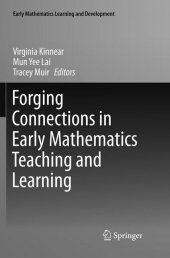 Neuerscheinungen 2019Stand: 2020-02-01 |
Schnellsuche
ISBN/Stichwort/Autor
|
Herderstraße 10
10625 Berlin
Tel.: 030 315 714 16
Fax 030 315 714 14
info@buchspektrum.de |

Virginia Kinnear, Mun Yee Lai, Tracey Muir
(Beteiligte)
Forging Connections in Early Mathematics Teaching and Learning
Herausgegeben von Kinnear, Virginia; Lai, Mun Yee; Muir, Tracey
Softcover reprint of the original 1st ed. 2018. 2019. xi, 284 S. 67 SW-Abb. 235 mm
Verlag/Jahr: SPRINGER, BERLIN; SPRINGER SINGAPORE; SPRINGER 2019
ISBN: 9811355959 (9811355959)
Neue ISBN: 978-9811355950 (9789811355950)
Preis und Lieferzeit: Bitte klicken
This edited book promotes thinking, dialogue, research and theorisation on multiple ways of making connections in mathematics teaching and learning in early childhood education.
The book addresses some key challenges in research, policy and practice in early childhood mathematics education. It examines diverse ways for learning experiences to connect young children to mathematics, and the importance of forging connections between mathematics and young childrenīs lives as key elements in their engagement with mathematics.
Each chapter provides research or theoretical provocations and pedagogical implications for connecting childrenīs lived experiences and ways of learning in mathematics teaching. The chapters are drawn from a range of international authors who raise important ideas within the overall context of current research and consider the theoretical and practical implications of their research.
As such, the book advances current thinking on mathematics teaching and learning for children in the early years from birth to eight years with an emphasis on children aged birth to 5 years. It considers the purpose and value in connecting mathematics teaching and learning to childrenīs lives, and provides provocations for both educators and researchers on the many under-researched and under-represented aspects of early years mathematics teaching and learning.
1 Forging Connections in Early Mathematics: Perspectives and provocations.- 2 Early Mathematics Education: A plea for mathematically founded conceptions.- 3 Powerful Frameworks for Conceptual Understanding.- 4 Building Connections between Childrenīs Representations and their Conceptual Development in Mathematics.- 5 Geometry Learning in the Early Years: Developing understanding of shapes and space with a focus on visualization.- 6 A Possible Learning Trajectory for Young Childrenīs Experiences of the Evolution of the Base-ten Positional Numeral System.- 7 From Cradle to Classroom: Exploring opportunities to support the development of shape and space concepts in very young children.- 8 Mathematizing Basic Addition.- 9 Connecting the Mathematics Identity of Early Childhood Educators to Classroom Experiences for Young Children.- 10 Using Mathematics to Forge Connections between Home and School.- 11 Young Childrenīs Reasoning through Data Exploration.- 12 Making Connections to Realize Learning Potential in Early Childhood Mathematics.- 13 Childrenīs Interests: Cultural ways of knowing Mathematics.- 14 Making Connections using Multiplication and Division Contexts.- 15 Slow Maths: A metaphor of Connectedness for Early Childhood Mathematics.
Dr Virginia Kinnear is a Lecturer in Early Childhood Education at Flinders University in South Australia. Her research interests include young childrenīs statistical learning and thinking, the development of critical and ethical thinking, and the intellectual attributes and processes that support mathematical engagement.
Mun Yee Lai is a Senior Lecturer in Mathematics at the Australian Catholic University. Her research interests are in pre-service teachersī mathematical knowledge for teaching, teaching for mathematisation, using variation theory, and Chinese primary-school childrenīs misconceptions in decimal numbers.
Dr Tracey Muir is a Senior Lecturer in Mathematics Education at the University of Tasmania. Her research interests include effective teaching for numeracy, problem solving in mathematics, the use of ICT in mathematics, and parental involvement in mathematics education.


